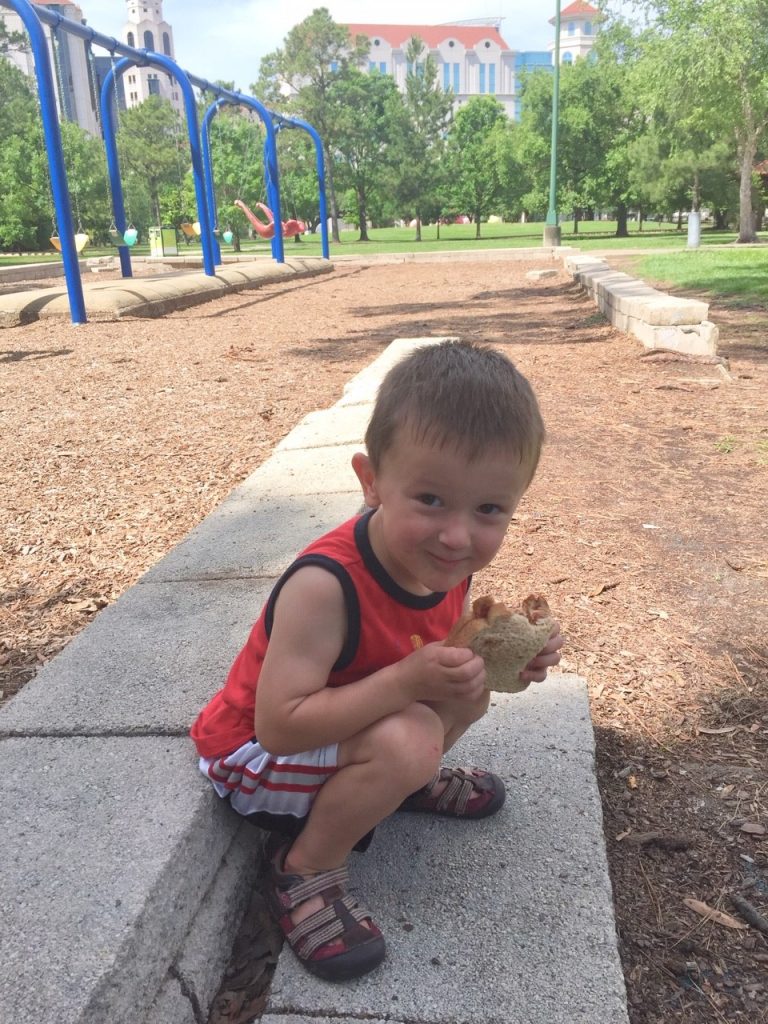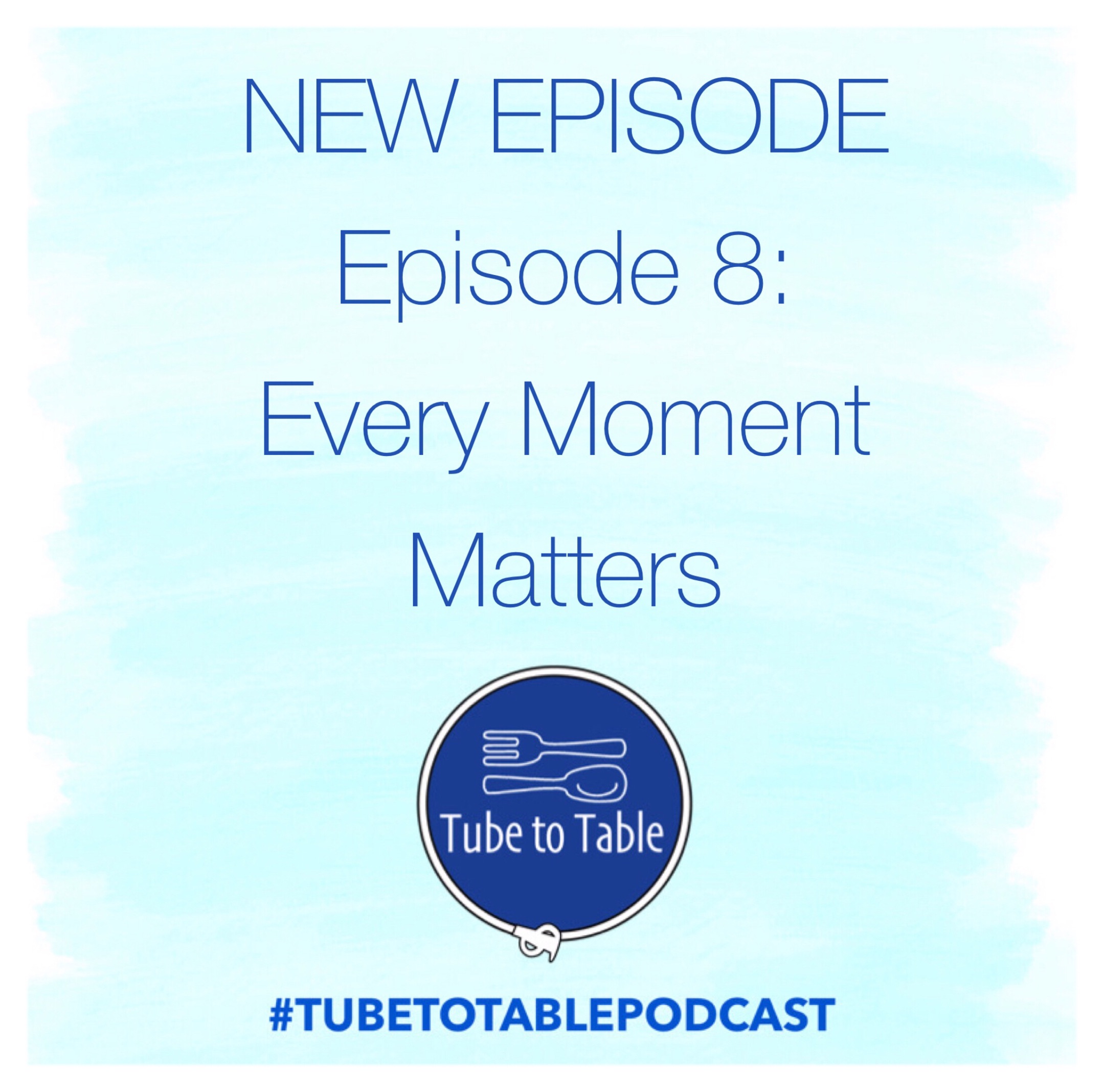Tube To Table Podcast Episode 8: Every Moment Matters
May 27, 2019
Posted in: Early Intervention, Feeding, Feeding Tube Weaning, Tube To Table Podcast
Is there a moment that stands out for you during you tube weaning journey? This week’s episode of the Tube to Table Podcast focuses on all the moments that stand out for both therapists and families during their tube weaning journey. A speech therapist and member of the Thrive Tube Weaning Program, Jamie Hinchey, joins the podcast today to discuss with Heidi their early career experiences that led them to the tube weaning program.
You can download this episode from Itunes, Stitcher, Spotify, Google Play, or listen to it below:
All the feeding therapists on the Thrive team come from different backgrounds that have led them to where they are today. Jamie has worked as speech-language pathologist for many years, initially starting her career working in early intervention. Heidi initially started her career as a speech-language pathologist working a children’s hospital focusing on feeding, swallowing, and working with children on feeding tubes.
What is Early Intervention?
The therapy is parent-driven, home-based, and incorporates therapy into the child’s daily routine. The coaching model of therapy is becoming more popular and involves working with families to empower them to feel confident working with their child during their daily routine. Rather than pulling the child out of their environment to do therapy, coaching and early intervention involves working on whatever a child would normally be doing at the time of therapy.
How are EI and the Thrive Tube Weaning Program similar?
The tube weaning program is based on the importance of incorporating the family and making therapy naturalistic so that it is sustainable. This may look different for every family, and that is okay. During the tube weaning process, therapists are in the home with the family, in the most natural environment, allowing for carryover. Like other therapy, we do work with your medical team and work to merge the medical side with the natural environment.
How are they different?
Traditional therapy, specifically Early Intervention, are much less intense. In the tube weaning program, there is a therapist in your home, working with your child, for 10 days, multiple times a day. The therapists can be there to identify the stress that can build up or observe various mealtime situations throughout one day. When the therapists are not in your home, they are talking to you between meals and can walk you through step by step how to respond to a specific mealtime behavior. A week is a very long time, especially with some of the families we work with. There is a lot of stress and concern that can build up over 2 hours and it is important to identify, catch, and work through strategies with the family.
What have WE learned?
There is a different amount of pressure and expectations when we are working in an intensive program. It is important to identify where a family is starting, what their expectations are, and how you can work to meet them where they are when they start the program. Every family has their own story and has been through various types of therapy, or no therapy at all. This is a time for reflection to talk with the family about what they know and how we can help them. There is no “magic wand” that our therapists wave when they walk in the door. It is appropriate to have expectations, but our job is to educate families on why we are doing what we are doing and why it may look different than traditional therapy. We want families to feel confident when we are not there and during their transition home. The coaching model that we discuss in this episode allows for parents to become confident and feel empowered to have a healthy, happy, responsive mealtime with their child.
What are families saying?
AT:
Was there anything that was different than you expected, either harder or easier? The only thing that was harder than we expected was the waiting game and putting A in control, but it obviously paid off.
What were the lessons or strategies that you learned that helped you to help your child become an eater? We learned to have more patience and give A the opportunities and wait for him to be ready and that we can’t force progress on him.
Is there a specific moment when you realized that your child was an eater? We realized he was an eater when our night time routine went from making formula, setting up the feeding pump, prepping formula for the next day, giving meds and g-tube care went to just giving him his meds. Also when his g-tube fell out for the first time after 2 years because lack of use!
AE:

Was there anything that was different than you expected, either harder or easier? The hardest thing for me was my own learning curve of trusting A’s natural instincts and her body’s self-regulation. Getting out of her way to learn how to regulate her hunger was really tough for me, but having a therapist who trained me and encouraged me was probably the key to our success. Having someone who knows what to expect, can validate my feelings as a parent/caregiver, and provide tangible ways to navigate whatever fear or anxiety we had made the hardest parts so much easier.
What were the lessons or strategies that you learned that helped you to help your child become an eater? Just learning how to get out of A’s way was the best tool I learned to help her become an eater. Giving her the room to figure out what her body was saying to her and me trusting her to do it was huge for us. Learning that our bodies know what they need and the things that A had learned early in her eating journey were her way of protecting herself. Getting out of her way at the table was also huge. Just eating a meal with no pressure on her to take bites gave her the space to explore without fear.
Is there a specific moment when you realized that your child was an eater? This is hard for me to pinpoint. A had been an oral eater when she was first born. For the first 4 months of her life she was eating, struggling, but she was eating. In my mind i knew she was always an eater, it’s just her circumstances hindered her. I knew it was possible, but having doctors dismiss her as an oral eater was really tough. The whole time we had her tube, I knew there was more for her. Eating real foods was always the expectation, I just didn’t have the knowledge or tools to get her doctors on the same page. I’m thankful I found Spectrum because they made the dream/hope of her eating a reality.
If you could talk to other parents or to medical professionals, what would you want them to know about eating or tube-feeding? I would want them to know that while the tube is a lifesaving thing, it’s important to know that it’s not something to be used forever. Each kiddo is their own little puzzle and will take some careful care in solving when it comes to eating. Having an open mind as a medical professional is so important and a breath of fresh air to the parent who wants to believe that their child can be an eater. And to parents, approach your medical team with respect, but don’t be afraid to advocate and speak up when it comes to their care. You have value and unique knowledge as a parent that a medical professionals don’t have when it comes to your specific child. You know your kid best and it’s so important to find a team that can respect you and take the time to really listen to your concerns and is open to collaboration.

AB:
Was there anything that was different than you expected, either harder or easier? I think the hardest part was trying to “read” his signals. Sometimes he would cry through eating and as he was nonverbal at that point, it was hard to figure out what he was trying to tell us. Another hard part for me was trying to get over the mentality of “amounts and ounces.” Everything that went into his tube was measured and specific, and it took me a LONG time to be ok with it if he didn’t want to eat much certain meals/some days. It was easier than I expected to get him eating. After so many months of trying to get him to eat, it only took 2 days for him to not receive anything else by tube. It still amazes me that after being a “non-eater” for a whole year, it only took him 2 days to figure out how to eat.
What were the lessons or strategies that you learned that helped you to help your child become an eater? I learned so much from the program and while it may not be what most doctors are telling you, the basic idea was so simple and everything just made so much sense to me, which is what sold me on the program. I have tweaked some things here and there as we’ve continued at home, which isn’t exactly ‘by the book’ but they’re things that have worked for us so A and I don’t get too frustrated. He has never been a big eater, and he is extremely busy ALL the time, so though ideally I learned not to have distractions at the table, we do do some other things at the table. My rule is that he has to start eating on his own, and eat a decent amount, he can’t just expect toys to bribe him into eating. Once he eats some on his own, he starts to get bored and will give me what I call his “bored-done.” When he was younger we would then look at pictures books and label colors and objects, which now that he’s older has become work on letters and words, numbers/counting, shapes, or I draw things and we label them. I figured if he’s learning things it’s better than just playing with toys to get him to eat. As long as he continues to eat cheerfully, we continue our activity. When he gives me signals that he’s really done, I respect that.
Is there a specific moment when you realized that your child was an eater? I don’t think there was a specific moment I realized he was an eater, I still look at him sometimes and am amazed by watching him eat (and grateful to YOU ) I think when the tube came out, it was a sigh of relief because it was gone and no longer an option. I smile every time I see him eating on his own with his little friends, or take the initiative to get food on his own.
If you could talk to other parents or to medical professionals, what would you want them to know about eating or tube-feeding? I would tell others that if the child is not hungry, they are not going to eat! Why would they??? I would also tell the doctors it IS NOT OK for a child to be in the 99th percentile for weight and vomiting 10+ times a day. I honestly believe A would still have his tube if not for the program. It is literally the one thing I tell people that changed his life (and mine). I was and still am so grateful for the follow-up support I received when I felt so lost and didn’t know what to do! To have someone encouraging me that I was doing things right was invaluable to me. I wish doctors could relax about “standard growth curves” when the child is clearly thriving developmentally.
Please feel free to share your story or your “moments” with us on our social media or email us and we would love to feature your story!

Be the first to comment